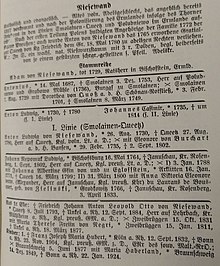Leopold Otto von Niesewand
Friedrich Johann Anton Leopold Otto von Niesewand (born July 8, 1793 in Queetz , † September 12, 1884 in Unkel ) was a Prussian major general and commander of the 14th Landwehr Brigade.
Life
origin
Leopold Otto was a son of Johann Nepomuk Ludwig von Niesewand (1764–1802) and his wife Johanna Albertine, née Countess von Egloffstein (1771–1799). His father was Lord of Queetz and Second Lieutenant a. D. After the death of his first wife, the father married Anna Viktoria Eleonore von Zielinski (1766–1833), widow of Alexander du Laurans de Bousquent, lord of Januschau on March 31, 1800.
Military career
After the early death of his parents, Niesewand lived with his uncle and on October 1, 1803, joined the fusilier battalion “von Stutterheim” of the 2nd East Prussian Fusilier Brigade of the Prussian Army as a private corporal . First as Portepeefähnrich , since January 1807 as Second Lieutenant, he took part in the battles near Walterdorf and Braunsberg in 1806/07 during the Fourth Coalition War. After the Peace of Tilsit , Niesewand came to the 2nd West Prussian Infantry Regiment on January 22, 1808 , but retired from the army on October 18, 1811.
With the start of the Wars of Liberation , Niesewand returned to the army on July 1, 1813 and was employed again in the 4th East Prussian Reserve Battalion, later the 3rd Reserve Infantry Regiment . During the war he was at the sieges of Torgau, Wittenberg and Magdeburg as well as the battle of Großgörschen and the battles near Zahna, Dessau, Zerbst and Ottersleben. For Dennewitz he was awarded the Iron Cross 2nd Class and for Waterloo the Cross 1st Class.
In mid-April 1815, Niesewand rose to prime lieutenant and was appointed adjutant of the 12th Brigade to III. Army Corps transferred. At the end of March 1817 he was promoted to captain and on October 15, 1818 he joined the 15th Division as an adjutant . On March 30, 1829 he was promoted to major and on August 16, 1831 appointed director of the division school. From there he came to Cologne on March 30, 1835 as commander of the 1st Battalion in the 28th Landwehr Regiment . On January 26, 1840, he was transferred to the 28th Infantry Regiment and on March 30, 1840, he was promoted to lieutenant colonel . On March 25, 1841, Niesewand was initially commissioned to lead the 10th Infantry Regiment and on September 12, 1841 he was appointed regiment commander. With the promotion to colonel , he was given command of the 28th Infantry Regiment on April 7, 1842. In September 1843 Niesewand took part as an observer in the exercises of the X. German Federal Corps. He was then appointed commander of the 14th Landwehr Brigade on March 27, 1847 and promoted to major general on May 10, 1848. As such, he took part in the suppression of the Baden Revolution in 1849 and was awarded the swords for the Order of the Red Eagle, 2nd class. On April 12, 1851, Niesewand retired with a pension .
On the occasion of the coronation of King Wilhelm I , Niesewand received the star for the Order of the Red Eagle, 2nd class with Eichenlau and swords on the ring, on October 18, 1861. He first lived on his estate in Leerbach in the Mühlheim district and then moved to Unkel, where he died on September 12, 1884.
In his assessment in 1842, General von Thile wrote: “An experienced, highly skilled staff officer who keeps the regiment entrusted to him in good order and leads it with security. In the treatment of his subordinates he shows prudence and correct tact, and his benevolent character ensures that they trust him. This trait, combined with a thorough education and an engaging personality, fully qualify him for a higher employment relationship. "
family
Niesewand married Therese Freiin von Negri (1811–1877) on October 15, 1831 in Zweibrüggen . The couple had several children:
- Anna Maria Josephine Hubertine Ferdinande (1839–1930) ⚭ Adolph von La Valette-St. George (1831-1910)
- Franz Joseph Maria Hubert (1832–1904), Prussian major general, Knight of Honor of the Order of Malta ⚭ June 5, 1877 Maria Haberland (1849–1924)
- Friedrich Wilhelm (1833–1916), Prussian Lieutenant General ⚭ Therese Karoline Hubertine von la Valette-Saint George (1837–1913)
- Eduard (1837–1913), Prussian district administrator
literature
- Kurt von Priesdorff : Soldier leadership . Volume 6, Hanseatische Verlagsanstalt Hamburg, undated [Hamburg], undated [1938], DNB 367632810 , p. 196, no. 1819.
- Gothaisches genealogical pocket book of the letter aristocratic houses . Justus Perthes , Gotha 1930, p. 599 ( Internet Archive ).
- Hermann Friedrich Macco : Contributions to the history and genealogy of Rhenish noble families. Volume II, Aachen, 1887 p. 118. ( correction )
- Obituary Thorner Presse September 20, 1884, p. 3. ( pdf )
| personal data | |
|---|---|
| SURNAME | Niesewand, Leopold Otto von |
| ALTERNATIVE NAMES | Niesewand, Friedrich Johann Anton Leopold Otto von (full name) |
| BRIEF DESCRIPTION | Prussian major general, commander of the 14th Landwehr Brigade |
| DATE OF BIRTH | July 8, 1793 |
| PLACE OF BIRTH | Queetz |
| DATE OF DEATH | September 12, 1884 |
| Place of death | Uncle |
